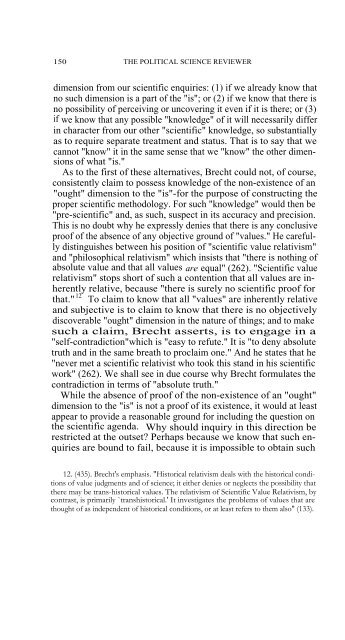ARNOLD BRECHT'S POLITICAL THEORY REVISITED Political ...
ARNOLD BRECHT'S POLITICAL THEORY REVISITED Political ...
ARNOLD BRECHT'S POLITICAL THEORY REVISITED Political ...
You also want an ePaper? Increase the reach of your titles
YUMPU automatically turns print PDFs into web optimized ePapers that Google loves.
150 THE <strong>POLITICAL</strong> SCIENCE REVIEWER<br />
dimension from our scientific enquiries: (1) if we already know that<br />
no such dimension is a part of the "is"; or (2) if we know that there is<br />
no possibility of perceiving or uncovering it even if it is there; or (3)<br />
if we know that any possible "knowledge" of it will necessarily differ<br />
in character from our other "scientific" knowledge, so substantially<br />
as to require separate treatment and status. That is to say that we<br />
cannot "know" it in the same sense that we "know" the other dimensions<br />
of what "is."<br />
As to the first of these alternatives, Brecht could not, of course,<br />
consistently claim to possess knowledge of the non-existence of an<br />
"ought" dimension to the "is"-for the purpose of constructing the<br />
proper scientific methodology. For such "knowledge" would then be<br />
"pre-scientific" and, as such, suspect in its accuracy and precision.<br />
This is no doubt why he expressly denies that there is any conclusive<br />
proof of the absence of any objective ground of "values." He carefully<br />
distinguishes between his position of "scientific value relativism"<br />
and "philosophical relativism" which insists that "there is nothing of<br />
absolute value and that all values are equal" (262). "Scientific value<br />
relativism" stops short of such a contention that all values are inherently<br />
relative, because "there is surely no scientific proof for<br />
that." 12 To claim to know that all "values" are inherently relative<br />
and subjective is to claim to know that there is no objectively<br />
discoverable "ought" dimension in the nature of things; and to make<br />
such a claim, Brecht asserts, is to engage in a<br />
"self-contradiction"which is "easy to refute." It is "to deny absolute<br />
truth and in the same breath to proclaim one." And he states that he<br />
"never met a scientific relativist who took this stand in his scientific<br />
work" (262). We shall see in due course why Brecht formulates the<br />
contradiction in terms of "absolute truth."<br />
While the absence of proof of the non-existence of an "ought"<br />
dimension to the "is" is not a proof of its existence, it would at least<br />
appear to provide a reasonable ground for including the question on<br />
the scientific agenda. Why should inquiry in this direction be<br />
restricted at the outset? Perhaps because we know that such enquiries<br />
are bound to fail, because it is impossible to obtain such<br />
12. (435). Brecht's emphasis. "Historical relativism deals with the historical conditions<br />
of value judgments and of science; it either denies or neglects the possibility that<br />
there may be trans-historical values. The relativism of Scientific Value Relativism, by<br />
contrast, is primarily `transhistorical.' It investigates the problems of values that are<br />
thought of as independent of historical conditions, or at least refers to them also" (133).
















